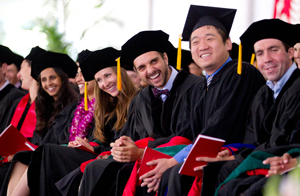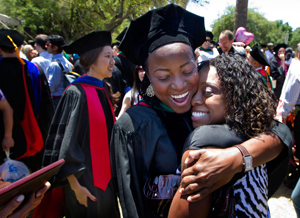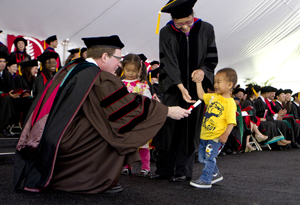June 17, 2013 - By Tracie White

Members of the medical school's class of 2013 listen to a speech by Long Nguyen, who spoke on behalf of the graduating MD students.
Finding your passion is key to success, Brian Kobilka, MD, said during his speech June 15 at the School of Medicine commencement.
In his usual self-deprecating manner, the Stanford scientist, who was awarded the Nobel Prize in chemistry last year, minimized his credentials and credited support from others for much of his success.
"I believe my career to date is an example of how a relatively average individual can achieve a measure of success through a combination of factors that include hard work, persistence, an element of luck and a great deal of help from family, friends and colleagues," said Kobilka, professor and chair of molecular and cellular physiology.
Under a white tent on the Alumni Lawn, in front of the Li Ka Shing Center for Learning and Knowledge, a crowd of about 1,500 family members, friends and colleagues gathered for the awarding of diplomas to the class of 2013. The graduates, in caps and gowns, sat on a stage. The graduating class totaled 225: 95 earned MDs, 91 earned PhDs or MD/PhDs, and 39 earned master's degrees.
Lloyd Minor, MD, dean of the medical school, gave the opening remarks, urging the graduates not to be afraid to take chances and reach for new shores as they begin careers as researchers and physicians.
"Sometimes you have to leave something good to find something even better," he said, in part explaining his own decision to leave Johns Hopkins University after 19 years to come to Stanford.

Kerry-Ann Stewart (left) hugs Sherian Maxwell, a roommate from her undergraduate years.
"In order to discover new oceans, you have to have the courage to lose sight of the shore," he continued, quoting Lord Chesterfield, a British statesman and man of letters.
He introduced Kobilka as a dogged researcher who came to Stanford in 1989 after attending Yale Medical School. Kobilka looked a little uncomfortable and nervous onstage — and he confirmed that was how he was feeling.
"It's somewhat ironic that I'm here addressing the class of 2013," Kobilka said. "First, Stanford was one of the many medical schools that rejected my application. Second, I might be considered a failed physician. It has been many years since I practiced medicine. ... I would have been better prepared with a PhD in biochemistry or physics. So in a way, I'm equally unqualified to address both the medical and graduate students."
That drew a laugh from the crowd, along with cheers from the PhDs onstage.
Kobilka traced the story of his career, beginning with his childhood in Little Falls, Minn., population 7,000.
"I had a pretty unremarkable childhood. My parents were loving and supportive. Neither went to college. My father was a baker. My mother was a housewife who worked part-time as a cake decorator. I don't remember any pressure from my parents ... to do well academically or to enter any particular career. I consider this one of their greatest gifts to me. They gave me a blank canvas to paint my own picture.
"I admired [my father's] work ethic, his skills in dealing with people, his sense of humor, devotion to family. His bakery was a relatively complex, small business with a large variety of baked goods. You can't tell from looking at me, but they were really, really good."
Kobilka chose to leave Little Falls, eventually going to medical school, where he developed an interest in intensive-care medicine and the drugs used in life-or-death situations that act on G-protein-coupled receptors, or GPCRs — particularly in the receptors for adrenaline and noradrenaline, which open the airways and boost heart rate.

Dean Lloyd Minor hands diplomas to 3-year-old Nina Mao and 1-year-old Roy Mao, along with their mother, Shashan Tuo, who received her PhD in genetics.
In the 1980s, Kobilka joined a lab at Duke University led by Robert Lefkowitz, MD, with whom he would eventually share the Nobel Prize for work on GPCRs, which serve as one of the main methods of communication within the body. They act as molecular switches, regulating nearly every physiological process in us.
"In 1986, I found my passion and the basis of my career for the next 25 years," Kobilka said. In 2011, while at Stanford, Kobilka and his team were the first to obtain a three-dimensional image of the exact moment a G-protein-coupled receptor clasped its signaling molecule while simultaneously kicking off a cascade of hundreds of reactions inside the cell. Such knowledge could lead to the design of better drugs to activate or inhibit the receptors.
Few believed it was even possible to achieve such a goal, and many thought it might be a waste of time, but Kobilka persevered, facing multiple failures and financial challenges along the way. "I wish you well in finding your passion," he said, addressing the graduates. "Don't give up till you find it."
For their part, the student speakers at the graduation ceremony gave thanks to family and friends for their support, both emotional and financial.
"At some point during our four to 11 years at Stanford, we were short with you, we took liberty with your patience, exhausted your generosity and asked for more, like the greedy-little-children-turned-doctors we're about to become," said Long Nguyen, class speaker for the MD students. "We were never as busy as you thought" — big laugh from the audience — "nor as tired as we claimed, but you gave us the space and time we needed to develop.
"You loved us so that we could learn to care for others," he said. "Join us for the lunch after the ceremony. That should get us all squared up."
Masoud Sadaghiani, class speaker for the PhD students, said, "If a kid like myself who couldn't speak a word of English 15 years ago — who literally looked up when he was asked what's up in high school — can stand before you today with such an accomplished group of individuals, we have come a long way."
After the diplomas were handed out, the new graduates joined family and friends, who eagerly awaited them with flowers, hugs, tears and cameras.
About Stanford Medicine
Stanford Medicine is an integrated academic health system comprising the Stanford School of Medicine and adult and pediatric health care delivery systems. Together, they harness the full potential of biomedicine through collaborative research, education and clinical care for patients. For more information, please visit med.stanford.edu.